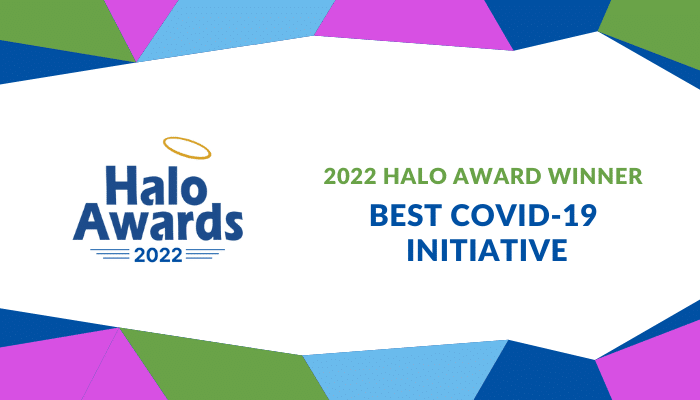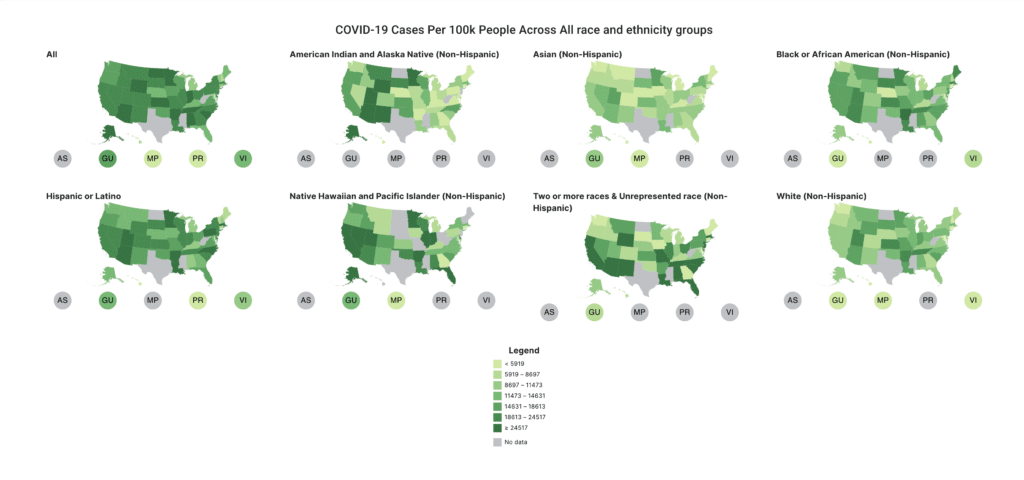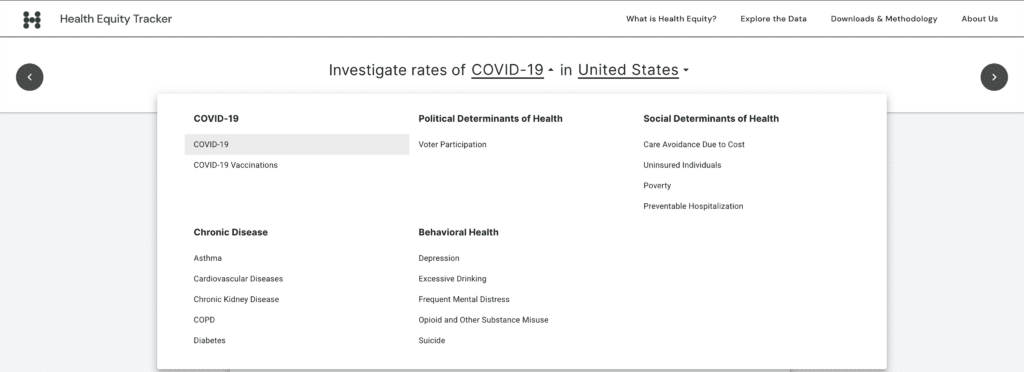Using Data To Advance Health Equity – Google.org & Satcher Health Leadership Institute at Morehouse School of Medicine

 When COVID-19 cases first surfaced, Google.org knew it could provide funding and technical expertise to help track the spread of the disease. The company was particularly interested in the disparate racial and ethnic impacts of COVID-19, believing tracking those statistics could lead to a more equitable government response.
When COVID-19 cases first surfaced, Google.org knew it could provide funding and technical expertise to help track the spread of the disease. The company was particularly interested in the disparate racial and ethnic impacts of COVID-19, believing tracking those statistics could lead to a more equitable government response.
 In the Satcher Health Leadership Institute (SHLI) at Morehouse School of Medicine, Google.org found the perfect partner. SHLI received a Google.org Fellowship which allowed a team of 18 Google employees—engineers, product managers, etc. to work with a team at Morehouse full-time for six months pro bono to launch the Health Equity Tracker (HET) in 2021. The tracker provides a detailed view of health outcomes by race, ethnicity, sex, socioeconomic status and other critical factors which can help policymakers understand what affected communities need to improve their health and circumstances.
In the Satcher Health Leadership Institute (SHLI) at Morehouse School of Medicine, Google.org found the perfect partner. SHLI received a Google.org Fellowship which allowed a team of 18 Google employees—engineers, product managers, etc. to work with a team at Morehouse full-time for six months pro bono to launch the Health Equity Tracker (HET) in 2021. The tracker provides a detailed view of health outcomes by race, ethnicity, sex, socioeconomic status and other critical factors which can help policymakers understand what affected communities need to improve their health and circumstances.
![]() Google.org’s goals for the program were to demonstrate the power of data and technology to make a difference in the world and to empower Google employees to use their expertise to give back.
Google.org’s goals for the program were to demonstrate the power of data and technology to make a difference in the world and to empower Google employees to use their expertise to give back.
Morehouse’s goals were to aggregate COVID-19 data from existing sources, cover other chronic diseases, along with social and political determinants of health, and empower policymakers.
 To achieve these shared goals, Google.org granted Morehouse School of Medicine $1.5 million to enable the real-time collection of COVID-19 data and grow its technology team. Eighteen Google employees worked on the project full time and additional Google employees worked on the project for 20% of their workweek. The two organizations created OpEd pieces, a video series and other media and communication aimed at helping other nonprofits use data and technology in their work.
To achieve these shared goals, Google.org granted Morehouse School of Medicine $1.5 million to enable the real-time collection of COVID-19 data and grow its technology team. Eighteen Google employees worked on the project full time and additional Google employees worked on the project for 20% of their workweek. The two organizations created OpEd pieces, a video series and other media and communication aimed at helping other nonprofits use data and technology in their work.
 The Health Equity Tracker received positive press in such publications as Politico, Yahooo Finance, STAT news and other business, science, government and technology outlets. The HET also achieved its goals of aggregating data, covering other chronic diseases and social and political determinants of health. Google donated more than 15,000 pro bono hours to the project. The HET has been cited by policymakers, public health officials, advocates and community organizers. Additionally, Morehouse has hired a product manager and two software engineers to continue to work alongside Google employees to take the work forward.
The Health Equity Tracker received positive press in such publications as Politico, Yahooo Finance, STAT news and other business, science, government and technology outlets. The HET also achieved its goals of aggregating data, covering other chronic diseases and social and political determinants of health. Google donated more than 15,000 pro bono hours to the project. The HET has been cited by policymakers, public health officials, advocates and community organizers. Additionally, Morehouse has hired a product manager and two software engineers to continue to work alongside Google employees to take the work forward.
